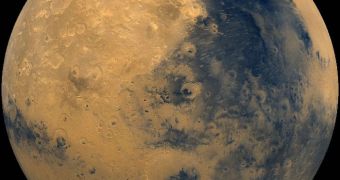The group of researchers that announced the creation of the world's first synthetic genome in May 2010 argued at a recent event that colonizing Mars could be made a lot easier and cheaper with the help of synthetic, genetically-engineered microorganisms.
Expert geneticist Craig Venter's team explains that such lifeforms would be perfectly adapted to using the carbon dioxide-rich atmosphere surrounding the Red Planet for producing a host of useful things.
For starters, the group said at the TEDxNASA@SiliconValley event on the evening of August 17, it may be possible to engineer microbes that can produce food, plastics, fuel and other materials from CO2. A huge portion of the Martian atmosphere is made up of the stuff.
According to the prominent biologists himself, deploying CO2-guzzling bacteria on the surface of Mars would ensure that space explorers have access to common resources that would otherwise need to be brought there from Earth at massive costs in funds and time.
What investigators are in fact proposing is the development of a new type of CO2-based chemistry, whose reactions would be especially applicable to Mars. “These kinds of processes will allow us to make almost anything needed there from that CO2 environment,” the biologist explained.
He added that the fundamental problems astronauts will be faced with while exploring Mars include getting access to food and fuel. Producing electricity, heating water and synthesizing medicine will also be important aspects to cover.
Venter believes that microorganisms can be custom-tailored to fulfill any of these tasks with great success. The work he and his team published last years showed that it is possible to assemble a working genome – suited for a certain task – in an artificial manner. Until recently, this idea was science-fiction.
“Obviously, food and fuel production are at the top of our list and society's list,” Space quotes Venter as saying. Even here on Earth, massive and rapid population growth rates are placing increasingly intense strains on available resources and adjacent exploitation, distribution and manufacturing chains.
“Use your imaginations to think of all the things, if you could design a cell, that we could make to change the future as we write this new software of life to create new sources of almost everything we need going forward,” Venter told event attendants.
In light of new discoveries about Mars – made over the past couple of years – scientists and space agencies are starting to really ponder the challenges that need to be overcome in order for them to become capable of deploying astronauts to Mars.

 14 DAY TRIAL //
14 DAY TRIAL //